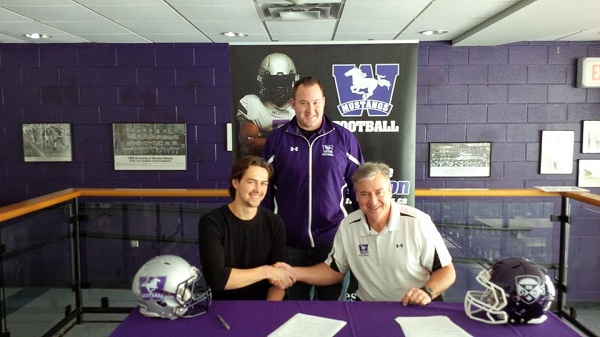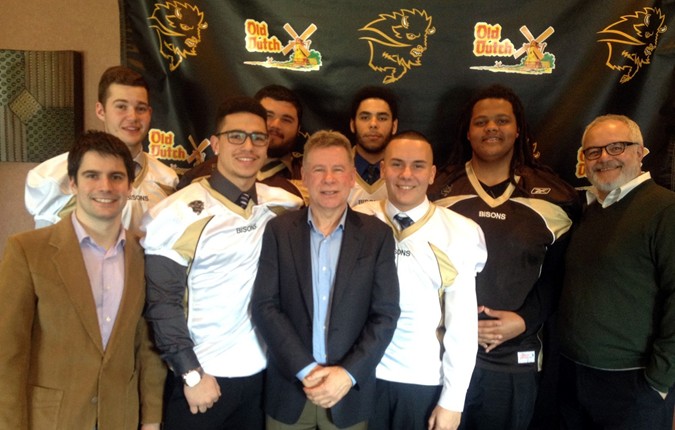Today, CanadaFootballChat.com begins an exclusive series on CIS Recruitment. Over the past few months, CFC Editor Ameeta Vohra interviewed several CIS Head Coaches to get their thoughts and perspectives on the current state of CIS recruitment.
In this first installment, the question of why the CIS does not have a third party policing system when it comes to recruitment regulations is explored and whether the system is a pipe dream or become a future reality. Additionally, coaches share their perspectives of what’s currently wrong with the CIS regulations and what steps are needed for positive change.
THIRD PARTY POLICING SYSTEM AND THE QUEST TO CIS REGULATION CHANGES:
With the recent Globe and Mail article on the accusations surrounding inappropriate recruitment tactics used by the UBC Thunderbirds to secure landing CFC#1 CLASS 2014 ranked Michael O’Connor, it brought into the spotlight some key questions regarding CIS recruitment.
For one thing, Why does the CIS not have a third party policing system?
What many are not aware of is that CIS stakeholders have been working on drafting a policy that is more updated and reflects the current state of recruiting nationally. Leading the charge for change has been Western Mustangs Head Coach Greg Marshall.
“I drafted a new set of recruiting rules two years ago,” recalled Marshall back in an interview this past August. “They’ve been through lots of different coaches committees, they’ve been through the CIS, and they’ve been through the athletic directors.”
“I hope that it is going to be passed next year because in principle it was agreed upon but in those rules I drafted, we’ve talked about third party policing and that’s part of it.”
However, Marshall said there are two big impediments that stand in the way in this system coming into fruition – finances and priorities. Despite those obstacles, he is optimistic this will come a lot sooner rather than later.
“Right now it’s a budgetary thing,” elaborated the Mustangs Head Coach. “CIS is looking at marketing and all the things they need to do market the sport and make it successful and it’s not easy.”
“It costs a lot of money to set up something and then prove it. It’s going to happen, but it moves slowly.”
One of the main issues Marshall sees with the current CIS regulations is that it allows loopholes for football programs to court recruits that go upon the current regulation of teams not offering incentives beyond a 50 dollar limit.
“Official visits need to be regulated,” expressed Marshall. “I also think enticements and there needs to be compliance on a regular basis so part of our whole strategy is that you don’t talk about employment.”
“Probably the biggest abuse in recruiting is employment. They know they can give this out in tuition fees but the promise of jobs and working in camps is something that is very hard to regulate.”
Bisons Head Coach Brian Dobie said that the lack of ensuring regulations is followed appropriately are due to funding.
“The lack of enforcement of all CIS regulations is directly related to a lack of funding and resources being directed toward this end,” shared Dobie. “With 27 teams there is a very good sense of collegiality and it is unfortunate that despite the respect shared between programs, we do believe that there is a need for some measure of independent enforcement. “
For his part, Windsor Lancers Head Coach Joe D’Amore says that currently teams are self-policing. However, it is not the best way to handle CIS regulations in an objective and fair fashion.
“I think it’s important that we have these rules and have meetings all the time,” added D’Amore. “The big thing for us is that you have rules and you can create as many rules as you want but if there’s no enforcement to the rules, it’s kind of hard.”
“Unfortunately, not everyone adheres to the self-policing.”
Despite the fact he advocates for a third party policing system, D’Amore is realistic. The geography, number of teams and funds available makes it hard for this to come to fruition.
“I still think there would be major challenges; I don’t think we’re the NCAA where we have 100 employees to go out there and do that,” assessed the Lancers Head Coach. “Even if we hire one or two people, they’re still babysitting 27 teams in a massive country.”
“The finances for two or three people to run all over the country to investigate would be tough, but I think it would be good to have a central location where things can be brought up and looked at; if it was a really big issue that they could attack it at that point. It’s not just the OUA or CIS and asking them to go out but at the same time we’re trying to build our program because you can’t do both.”
D’Amore said that football programs have lost sight of the main goal of what recruitment and official visits should be all about.
“I think it’s more the ability to enforce and maybe some limitations on what we can do with the kids as far as visits and things like that,” offered D’Amore. “To me the experience should be about the student-athlete experience, not really about how you can woo.”
“It’s shouldn’t be about all the other things – all the flashy stuff. I don’t think we should be approaching it like the pros, like the NCAA. I’m not one to provide clothing; I’m a firm believer that you should wear my gear if you are here. I don’t know why you want to wear clothing like from a school you don’t attend; that’s just my opinion. In the past, taking them to see professional games, all that kind of wooing isn’t what it should be about. Young people are influenced by those things, they enjoy them. That’s the generation and I understand why people do it. There has to be more control over that.”
Wilfrid Laurier Golden Hawks Head Coach Michael Faulds says that enforcement is needed because some teams clearly don’t play by the same rules as others. However, at the centre of the funding issue is mainly who should foot the bill to bring in the third party policing – the CIS or the 27 teams?
“Whether the CIS or league-to-league finding money for this individual for this third party policy or whether each team has to put a chunk of change towards an individual or a group of people who are going to go around policy,” commented Faulds. “I think it is important; we tend to have a gentleman’s agreement within the CIS and within the coaching ranks that we’re not going to go outside.”
“I will say that we are all really strong competitors so no one wants to be a cheater but there is definitely bending of the rules at times. It’s tough for us to police ourselves, so I think the third party policing is something that should happen in the future.”
While third party policing is something StFX X-Men Head Coach Gary Waterman welcomes, logistics and funding has made it difficult for it to become a reality.
“Policing is a complex issue,” said Waterman. “A third policy policing system would be great but the reality is that we are spread from coast to coast which makes it very challenging to have just one centrally located branch that can truly service and police the entire association.”
“Perhaps if each conference had its own third party policing system, which then reported to a central branch, it might work. However this concept would be very expensive. Is our system perfect the way it is now? I would say definitely not, but as an association I believe we are heading in the right direction.”
However, with the new CIS regulations slated to come in as early as the New Year, Waterman said it’s a positive change but that all programs will need to inform themselves of what the bottom line means so they do abide by the rules.
“We are re-visiting our current recruiting policies and asking ourselves if the policies reflect our current times,” explained the X-Men Head Coach. “The key as we move forward is to make the necessary changes to get them up to-date.”
“Once this is complete we need to educate all of the parties involved of the changes by publishing them and requiring all parties to sign off stating that they have read and abided by them. The final piece of the puzzle would be to update the current enforcement and punishment model. There must be consequences with teeth to deter rule breakers. Enforcement would need to be a top priority to truly make impactful change.”
The CIS Task Force has been diligent at putting forth a new policy to address several key issues;
“The task force is working hard to ensure that all programs have an equal opportunity to be successful,” commented Carleton Ravens Head Coach Steve Sumarah. “The new recruiting document that will be out soon is a first start.”
“This will include changes to visits, camps, official visits etc. It will be very extensive and in depth.”
McMaster Marauders Head Coach Stefan Ptazsek said that continual dialogue is necessary between all the stakeholders to make the final product something that benefits both teams and recruits.
“Improved communication across the country is the primary objective,” commented Ptazsek. “The CIS has countless hard working dedicated professionals attempting to grow their respective football operations. “
“The task force has already done a great job of summarizing all of our regional challenges and recommended some very positive first steps.”
Echoing the sentiments of other coaches, Ptazsek said funding is what will control how effective policing will become in future years. However, the hope is that the policy reflects the overall CIS philosophy.
“Resources are at the core of our limited centralized accountability and control processes with respect to recruiting,” elaborated the Marauders Head Coach. “As we continue to evolve to more privately funded and big budget programs, standardizing the recruiting process and educating all parties involved to the rules and infrastructure is important to ensure the spirit and values of CIS sport are upheld.”
While it may only be a couple of weeks away from the start of positive change in CIS recruitment, there is an abundance of optimism from CIS football programs that the task force is headed in the right direction.
“It is imperative that all changes must carefully consider how they affect the unique challenges in each of the conferences,” expressed Dobie. “Any rule changes must consider compliance and enforcement.”
“We believe that the presence of the CIS task force is very encouraging and a sign of positive development.”
Later this week, CanadaFootballChat.com will have the second installment of this series.
Advocating for football prospects one story at a time.




















 CFC Youth Game Spotlight: Quebec OL ready to lock it down
CFC Youth Game Spotlight: Quebec OL ready to lock it down